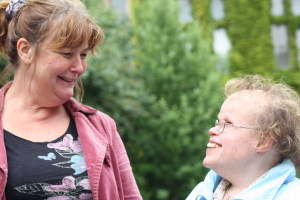Learning disabled role is world first for academia
29 Jun 2012
A journal has published an edition of articles which have been edited and peer reviewed by people with learning disabilities, in a first for academia anywhere in the world.

A University of Manchester team of academics and people with learning disabilities worked together on the British Journal of Learning Disabilities edition, which is published this week.
Team member Dr Rohhss Chapman, says the project shows it is possible to make research into learning disability much more inclusive.
And the work, she said, spurred a debate among the team into how inclusive much research involving people with learning disabilities really is.
It also, she said, raised questions about the language learning disability researchers should use to make their work more accessible.
Lou Townson, is one of five members of The University of Manchester team who has learning difficulties.
Her parents were told by doctors she would never walk or talk, but has proved them wrong, planning to publish her autobiography next year. She is also visually impaired.
She said: “From my own experience as someone with learning difficulties, I feel that there is nothing we can’t do, we just might need a bit more support.
“In terms of working with researchers, it’s isn't usually the information which is difficult to understand but the way it is presented. We learned a lot by working ion this on this journal.
“People with learning difficulties do have a valuable contribution to make to academic research into learning difficulty and I hope our work helps to make the case.”
The journal articles include a piece on the Canadian education system, an insight into the complexities of communication for people with Asperger’s, breaking bad news and the low take up of Annual Health Checks in Oxfordshire.
Dr Chapman said: “As an inclusive group of researchers at The University of Manchester, we are pleased whenever we see research with and by people with learning disabilities rather than on people with learning disabilities.
“Learning disabled researchers find it difficult to gain a rightful place in discussion within academia – even though they have a great deal of insight and knowledge.
“This is despite government departments, research councils and the larger charities demanding greater inclusivity.
“This is not to say that there were some difficulties in the process of publishing this edition
“Some of the papers, for example, involved sensitive topics which upset some of our team, sparking a discussion about if learning disabled people should be shielded from difficult issues or not. The considered opinion of the team was generally not, providing effective support was in place.”
The editor of the Journal, Professor Duncan Mitchell who is based at Manchester Metropolitan University said: “This special edition of the journal is significant because it explores ways in which people with learning disabilities can engage in research and ensure that papers that are about them are written and reviewed by them.”
